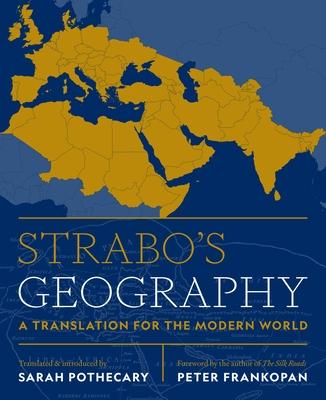A lively new translation of Strabo's complete Geography--an encyclopedic guide to the ancient world of the first century CE--connecting it with the world of the twenty-first century
Strabo's Geography is an encyclopedic description of the ancient world as it appeared to a contemporary observer in the early Roman empire. Information about taming elephants, collecting saffron, producing asphalt, and practicing yoga is found alongside accounts of prostitution, volcanic activity, religious festivals, and obscure eastern dynasties--all set against the shifting backdrop of political power in the first century CE. Traveling around the Mediterranean, Strabo gathered knowledge of places and people, supplementing his firsthand experiences with an immense amount of reading to create a sweeping chronicle that attempts to answer the implicit questions "Who are we?" and "Where do we come from?" Sarah Pothecary's new translation of Strabo's complete Geography makes this important work more accessible, relevant, and enjoyable than ever before. Conveying the informal, lively, and almost journalistic style of Strabo's Greek, this translation connects the ancient and modern worlds by providing modern names and maps for places mentioned in the text, a generous page layout, and marginal notes, allowing readers to appreciate Strabo's work directly and immediately. The result mimics what Strabo was doing two thousand years ago--relating the rapidly changing present of his original readers to their own ancient past. A remarkably modern translation of a revealing window on the ancient world, this is essential reading for anyone interested in how we look at both antiquity and the world today.
A lively new translation of Strabo's complete Geography--an encyclopedic guide to the ancient world of the first century CE--connecting it with the world of the twenty-first century
Strabo's Geography is an encyclopedic description of the ancient world as it appeared to a contemporary observer in the early Roman empire. Information about taming elephants, collecting saffron, producing asphalt, and practicing yoga is found alongside accounts of prostitution, volcanic activity, religious festivals, and obscure eastern dynasties--all set against the shifting backdrop of political power in the first century CE. Traveling around the Mediterranean, Strabo gathered knowledge of places and people, supplementing his firsthand experiences with an immense amount of reading to create a sweeping chronicle that attempts to answer the implicit questions "Who are we?" and "Where do we come from?" Sarah Pothecary's new translation of Strabo's complete Geography makes this important work more accessible, relevant, and enjoyable than ever before. Conveying the informal, lively, and almost journalistic style of Strabo's Greek, this translation connects the ancient and modern worlds by providing modern names and maps for places mentioned in the text, a generous page layout, and marginal notes, allowing readers to appreciate Strabo's work directly and immediately. The result mimics what Strabo was doing two thousand years ago--relating the rapidly changing present of his original readers to their own ancient past. A remarkably modern translation of a revealing window on the ancient world, this is essential reading for anyone interested in how we look at both antiquity and the world today.Hardcover
$72.22